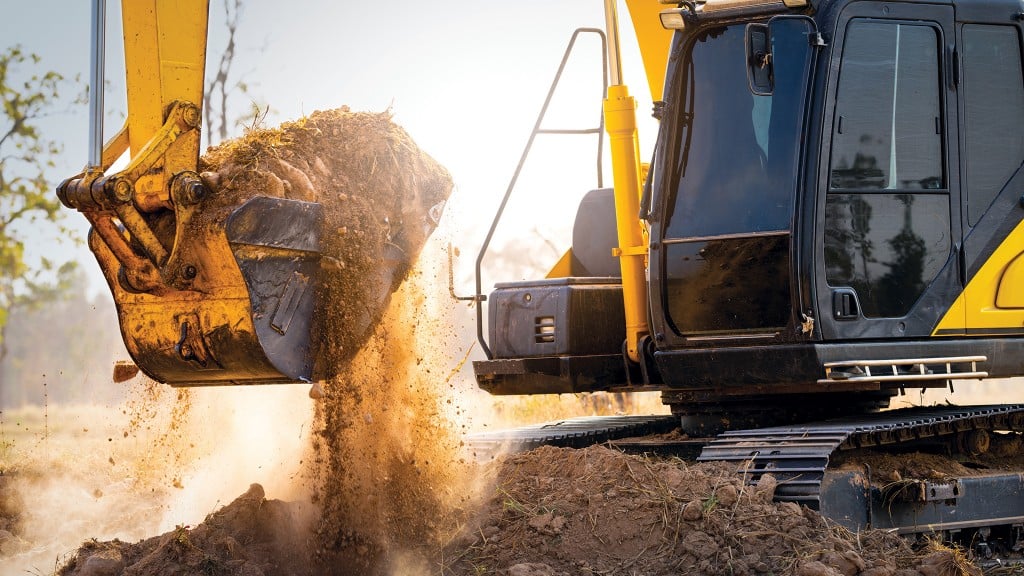This smart financial move puts money in your pocket and the newest equipment to work
Equipment-as-a-Service can help your business pay as you go for machinery you need now while avoiding onerous upfront capital expenditures and providing greater predictability.

In the world of heavy equipment, ownership can be costly and burdensome. Aside from the initial purchase price of equipment, there is also the financial responsibility of maintenance, repair, and eventual depreciation.
This is where Fair Market Value (FMV) leases can offer significant cost advantages and flexibility. With an FMV lease, organizations can receive the full benefits of using the equipment while only paying for a portion of the machine's value over the lease term.
FMV leases free up capital
An FMV lease is a type of operating lease that allows businesses to use equipment for a specified period while making regular payments. This structure is particularly beneficial for companies that need access to heavy equipment but don't want to invest large amounts of capital up front.
At the end of the lease term, the business has the option to return the equipment, extend the lease, or purchase the equipment at its fair market value.
Additionally — and as mentioned previously — one of the biggest advantages of an FMV lease is that it allows businesses to use equipment without having to pay the full cost of ownership. This is especially valuable in the construction sector, where equipment is essential but not always needed long-term. Rather than tying up capital in equipment purchases, companies can allocate those funds toward other critical operational areas.
With an FMV lease, businesses only pay for the use of the equipment during the lease term and are not responsible for the total value of the machine, as they would be with an outright equipment purchase. The result is a more efficient use of financial resources, allowing companies to access the equipment they need while keeping their capital free for other investments.
The advantages of the equipment-as-a-service model
The concept of "equipment-as-a-service" has gained popularity in recent years, and FMV leases are a prime example of this model in action. With equipment-as-a-service, businesses essentially rent the functionality of the machine rather than owning it outright. This approach offers several advantages.
Equipment-as-a-service allows businesses to control costs more effectively by only paying for the use of the machine rather than bearing the total cost of ownership, maintenance, and repairs. Companies can use the equipment for as long as needed and then return it at the end of the lease term, avoiding the long-term commitment and costs associated with ownership.
With an FMV lease, businesses can easily upgrade to newer models at the end of the lease term, ensuring they always have access to cutting-edge technology and the best tools for the job. This regular access to newer equipment can lead to improved efficiency, reduced downtime, and, ultimately, a stronger bottom line.
The ability to turn variable costs into fixed costs has a direct impact on a company's cash flow and financial forecasting. When costs are predictable, it's easier for businesses to allocate funds toward other essential areas such as labour, materials, and project development. This is especially important in an industry such as construction, where cash flow can be inconsistent due to the seasonal nature of the work and dependencies on supply chains and project timelines.
By returning equipment at the end of the lease and opting for newer models, businesses can also avoid the pitfalls of owning outdated equipment, which can become costly to maintain and less efficient over time.
A look at the equipment-as-a-service model in action
ABC Construction needed a fleet of excavators for a two-year project. Instead of purchasing the machines outright, ABC opted for an FMV lease.
By choosing to lease rather than purchase, ABC Construction effectively shielded itself from potential financial losses tied to the resale of depreciated equipment at the project's end. This savvy decision relieved the company from the obligation of paying the total value of the machines up front and eliminated burdensome maintenance costs.
Opting for a Fair Market Value (FMV) lease allowed ABC Construction to streamline its expenses into a single manageable monthly payment. This not only ensured consistent monthly costs covering the equipment but also included essential maintenance, repairs, and soft costs like installation. Such an approach not only simplifies budgeting but also enhances operational efficiency, making it a wise choice for any construction firm.
This strategic shift stabilized ABC Construction's cash flow, providing the funds needed for critical areas like hiring skilled labour and procuring materials. As a result, the company boosted profitability and increased its capacity to take on more projects without the fear of unexpected financial burdens.
At the conclusion of the 24-month project, ABC simply returned the equipment, having only paid for its use throughout the lease. This method allowed them to expand its equipment fleet for the larger short-term project and return the machinery once it was no longer needed. Ultimately, this strategy put them in a prime position to upgrade to the latest models, ensuring the company always has access to cutting-edge technology for future projects.
By leasing rather than purchasing, ABC Construction avoided the costs associated with making payments on the full value of the machine, in maintaining that equipment and taking a loss on the eventual sale of this depreciated equipment at the end of its useful life. By opting for an FMV lease, ABC Construction was able to bundle all these variable costs into its monthly lease payment. Over the course of the lease term, the company enjoyed fixed monthly costs that covered not just the equipment, but also all associated maintenance, repairs, and soft costs such as installation.
This shift allowed ABC Construction to stabilize its cash flow, ensuring it had sufficient funds available for other important areas such as hiring skilled labour and purchasing materials. As a result, the company saw increased profitability and was able to take on more projects without having to worry about unexpected expenses.
At the end of the 24-month project, ABC simply returned the equipment, having only paid for the use of the machines during the lease term. ABC Construction was able to expand its equipment fleet to accommodate this larger short-term project, then return the equipment at the end of the lease, when it was no longer needed. Ultimately, they were able to upgrade to the latest models when their next project required more advanced technology.
A smart, flexible solution for equipment needs
FMV leases provide businesses with the flexibility and financial efficiency needed to stay competitive in the construction sector. By allowing companies to receive the full benefit of equipment without paying for its total value, and by offering the option of regular equipment upgrades, FMV leases are effectively turning equipment into a service that businesses can rely on.
An FMV lease provides more than just access to equipment — it offers financial predictability. By converting variable costs such as repairs, maintenance, and soft costs into fixed payments, construction companies can better manage cash flow, reduce financial risks, and make more informed business decisions. For greater financial stability in an unpredictable industry, an FMV lease is a valuable tool that is worthy of consideration.
Nelson Abelha is the regional vice president of First Financial Canadian Leasing.



